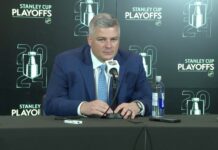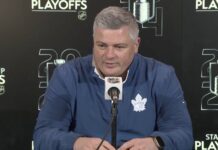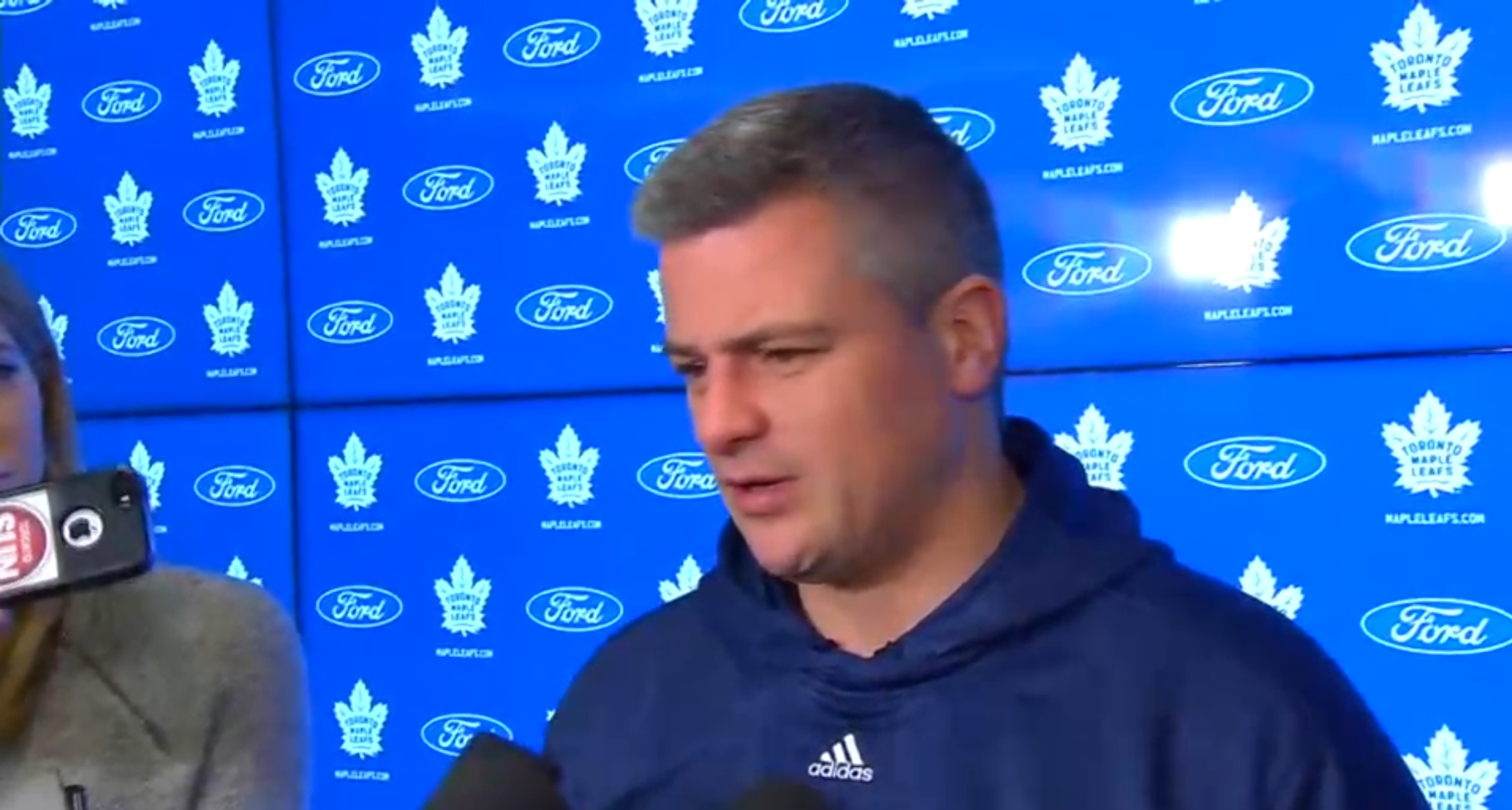Sheldon Keefe addressed the media after practice on Friday, discussing the challenge against the Chicago Blackhawks tomorrow night, the All-Star Break, how he wants the team to play in the lead, and Kasperi Kapanen’s development.
What was the pre-scout like for a coach who has yet to see this Blackhawks team as you continue to make your way through the NHL?
Keefe: Every day is interesting. There are a lot of similarities, though, in each team that you play in terms of concepts and things that teams are trying to do. The players are different from team to team, obviously, but each team, for the most part, has elite players that you have to be aware of. The habits and details that you need to have to defend against those guys are the same. The message is pretty similar is what I am finding. We just have to work at the details. Our support staff does a great job of that.
How important is the game given you are going to have the time off and then a road trip to start up again?
Keefe: Any time you are going into a break, you want to finish on a high note. It gives everybody a better feeling leaving the rink. We want to also just finish off our week on a positive note. We’ve been able to get three out of four points here thus far. Having a tough week at home the week previous, we want to be on the right side of it. It is a good chance for us to do that.
You mentioned the longer breaks in the Marlies‘ schedule. What was the mental benefit you found and do you expect that it will be the same for this group having next week off?
Keefe: The mental benefit is really the biggest one. The physical benefit is that you get the rest and all of that kind of stuff, but it does take its toll on your execution and your details. The mental part of it is what is most important — to have that break and come back feeling refreshed, not unlike anyone else who gets some time away from their everyday grind. We feel it will serve our team well.
What is the message to the team about defending Patrick Kane?
Keefe: Like I was saying, it seems like every team you play — Gaudreau yesterday — you are playing against players that are high calibre and are dangerous. We have to keep the puck out of their hands, first and foremost, so that when we have the puck, we make them have to defend as much as we can. That really helps us, and then just the details of knowing where they are on the ice and getting back into defensive structure quickly to make them have to come through us and not open up the zone and open up the ice. The more room they have, it is tough to stop them and certainly that will be put to the test tomorrow.
Jason Spezza was saying that he likes to take the optional skates and he’s had to be convinced to not go on the ice quite as much. What has been the push-pull with him in that regard?
Keefe: We’ve just tried to manage him. It is not necessarily me that is having those conversations with him. Our medical and sports science staff are the ones who cover off those types of things with what players need. Spez has been at it a long time and knows what he needs. He loves to be on the ice. He loves to touch the puck and work on different things.
It is a balance for managing him on that sense, but it is also a balance for us for guys that are hungry and want to be out there. It is really good for our young guys to see that he is not just out there messing around — he is out there with very purposeful drills and is working to get better. At his age and what he has accomplished in the league, he sets a really good example for our team.
How valuable has Rich Rotenberg been for you as a resource?
Keefe: I’ve worked with Rich all the way back to my Soo days. He has been a big part of my development as a coach and looking at things differently and really valuing what it is that the players need… trying to get out of my own way and make the people that are smarter than me make decisions and help us formulate a plan as a staff. He has been terrific and all of the feedback from the players has been very good, too. That is most important.
Kasperi Kapanen mentioned that he might have been a challenging pupil when he first came over here and started playing for you in the A. Have you seen maturity in him now a few years later?
Keefe: I certainly have. A big part of it, first of all, is that no one really likes to play in the American league, particularly players of that calibre and that talent and that pedigree. They want to be in the NHL fast. When it is not happening, you are not always getting the best version of that player when they come to the rink every day. That is a big challenge and it was one for Kappy.
When you are here in the NHL, it is different. The guys are generally happy. They are where they belong. They’re in a different lot in life. To me, Kappy has been good. His energy has been good every day. He is working in practice. He is taking advantage of the opportunities he gets when he moves up and down the lineup. He is wanting to tackle those head on. I have seen maturity in that sense, for sure.
In your share experiences, do you have an honest relationship with him? Are you open about what you need to see and what he is doing?
Keefe: I think so. There is a history there. There is — I hope — some trust in it, but also, you have information. You’re not filling as many gaps in terms of what a player has been through and what their personality might be and what they might respond to. Those are the kinds of things — not just with Kappy but with all of the players i’ve had the benefit of coaching with the Marlies — that I try to take advantage of as best I can.
The balance between offense and defense — how much of what this team has to learn is trusting what you guys do even when you are ahead instead of the natural hockey instinct, which is kind of not how you guys play all the time?
Keefe: That is a big part of it. You just used the term, “all the time,” and I think that has been something we’ve been talking about. Being smart and intelligent and purposeful with the puck is an all the time thing for us and not a “some of the time” type of deal. It is the same thing with our attention to detail defensively. We can’t just do it for a period or shift. We need to do it all the time.
That is what you are working towards as a team. It is not always going to be perfect. There are always going to be mistakes, but you want to be consistent and disciplined in everything that you are doing. That is what we are trying to work at every day.
When you have a lead in hockey, many teams become conservative. That doesn’t seem like something you guys are interested in or are aligned to.
Keefe: We don’t want to be conservative in terms of giving up the puck and forcing ourselves into defensive postures. That is a big one for us. We want to be a team that retains the puck. But we do want to be a little more conservative when it comes to picking our spots on when we give up the puck, such as when we shoot it and when we try to force a pass that maybe we don’t need to. Our play with the puck, we want to be more deliberate in terms of retaining it — not necessarily having to force it to get the next goal. That is a challenge for us because when we have the puck a lot, we seem to open up the ice and then you have a great look.
Usually, when you have a great look at the net offensively, it makes you really vulnerable going the way. That is a challenge. That is a big part of what 3-on-3 OT is. When you have a great look, you’re vulnerable going the other way. It happens at 5-on-5, too. You have a good look offensively and we have elite players that want to take advantage of it, and then you’re vulnerable the other way. There is a real balance there that we haven’t found yet, but we are working towards it. Yesterday, there were some really good steps in that regard.


![Jim Montgomery Post Game, Bruins 4 vs. Leafs 2: “[Marchand] still manages to get under people’s skin, yet he doesn’t cross the line” Jim Montgomery, Boston Bruins post game](https://mapleleafshotstove.com/wp-content/uploads/2024/04/jim-monty-pg-to-218x150.jpg)
























![Jim Montgomery Post Game, Bruins 4 vs. Leafs 2: “[Marchand] still manages to get under people’s skin, yet he doesn’t cross the line” Jim Montgomery, Boston Bruins post game](https://mapleleafshotstove.com/wp-content/uploads/2024/04/jim-monty-pg-to-100x70.jpg)







